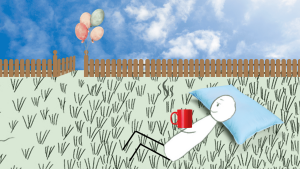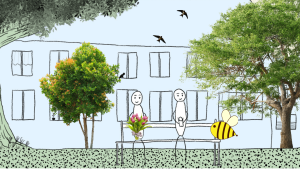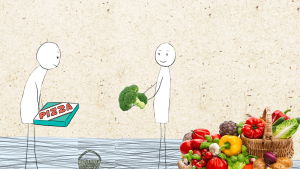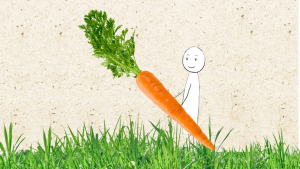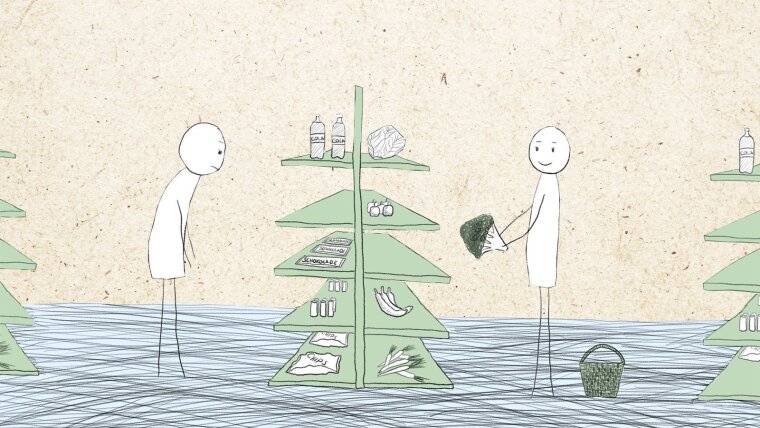
Well-being in everyday life, conscious nutrition, a healthy lifestyle: Many steps that we take here are a great complement to a sustainable way of life.
In this section, we offer suggestions on how you can behave responsibly without having an everyday life marked by unfulfilled joys and missed pleasures. Only if you take care of your own resources you will have the strength to shape your environment in a sustainable way.
-
Mindfulness in daily life
A person lies in the grass with a cup of tea.
Collage: Julian Ukena, Tabea Seeßelberg, via canva.com: Khaneeros, Billion Photos, NanchaikanSustainable behavior implies to find a responsible way of relating to yourself. One important aspect of treating yourself well is awareness towards your own state of well-being and your individual needs. This principle is also called mindfulness and refers to the reflection on your current emotional state and physical condition.
Commercials suggest that we can satisfy all our needs by buying new products. However, it often really helps to consciously pause for a moment and feel within yourself what you really need and how you can lastingly satisfy your needs.
- The CampusCouch de (Website available in German only). team, formed by psychology students, offers a low-barrier and timely listening service for Students where thoughts and feelings can be expressed and sorted out together. Conversations are possible in English also.
- You can find inspiration about mindfulness practices by listening to the podcast Campus TalksExternal link (available in German only) produced by the Student Health Management.
- For more information about health, climate crisis and sustainability in Jena, check out Health For Future JenaExternal link (available im German only).
-
Get out into the fresh air!
Two people are sitting relaxed on a bench outside.
Collage: Julian Ukena, Tabea Seeßelberg, via canva.com: Johannes Kornelius, Splashy LocketOff to nature
To balance out your part-time or full-time studies, the Jena area offers wonderful opportunities to clear your head and do something for yourself.
In every season from spring to fall you can discover beautiful places in the Saale Valley.
- Get moving! University Sports offers many activities outside in the fresh air. Booking for the courses usually starts at the beginning of the semester. With the Unisport Card you can try out different activities and attend classes spontaneously.
- For a break in between classes, you can find a green place to unwind and take a deep breath in the Paradiespark, the Prinzessinnengarten, the Botanical Garden, the Schillergarten or Frommannsche Garten.
- If you have a little more time, hikes to the Jenzig, to the Napoleonstein, to the Lobdeburg or on the Saale-Horizontale are worthwhile.
- For longer trips, you can find beautiful hiking trails through diverse landscapes on thueringen.infoExternal link (available in German only) or komootExternal link. For longer trips, you can book discounted group accommodationExternal link in the Thuringian Forest via the Studierendenwerk!
- Take a bike ride along the beautiful Saale Cycle PathExternal link. With your semester ticket (thoska) you can take your bike on the regional trains in Thuringia for free!
-
Nutrition: Organic, seasonal, regional & fair trade
A person with a pizza meets a person with a basket of vegetables.
Collage: Julian Ukena ,Tabea Seeßelberg, via canva.com: ourlifelooklikeballon, SchwarzenarzisseFood matters
A balanced, diverse and high-quality nutrition contributes significantly to our well-being and is one of the biggest levers we can use to counteract climate change in our everyday lives.
Of course, the best thing would be to eat food produced in your own garden, but not everyone has the opportunity to do this in their busy university lives. That's why labels help you make sustainable consumer choices. But what does it all mean for the climate, the environment and the people who produce the goods?
Organic, because...
... synthetic fertilizers and chemical pesticides as well as genetic engineering are avoided in the cultivation of crops. This allows greater biodiversity to be preserved. The well-being of animals is also improved.
Seasonal and regional, because …
... seasonal products can be grown close to where they are consumed. This saves greenhouse gas emissions and resources that would otherwise be used during long-distance transport, processing and storage of the food.
Fairtrade, because …
... products marked with this label comply with both social and environmental standards along the supply chain. Fairer wages, a ban on forced and child labor, ecological consistency - these are the principles behind the Fairtrade logo.
This is how you can make your diet more sustainable:
- In the dining hall: Food produced organically such as vegetarian and vegan dishes are marked in the menu. Also watch out for the "Mensa regional" and "Mensa vital" seals.
- Use a seasonal calendar! What grows in your local region at which time of year?
- Be your own cook! Processed food often has a bad carbon footprint and is generally unhealthier (lots of sugar, flavor enhancers, etc.).
- Find initiatives in your neighborhood where you can obtain regional, organic produce or save food from from going to waste. For example:
- Urban Gardening, e.g. FlusslandExternal link (available in German only).
- Affordable organic produce, for example via the producer-consumer association Grünfutter Jena e.V. External link(available in German only).
- Foodsharing Jena organizes weekly distributionsExternal link, where rescued food is redistributed for free. It is also worthwhile to drop by regularly at the Fairteiler in the Grünes Haus (Schillergässchen 5).
- Make your own bread spread! Many delicious vegan recipes have been collected by the Student Councils "Umweltreferat" in the brochure "Pflanzen aufs Brot"External link (Plants on Bread, available in German only). Maybe you can even team up with friends and take turns producing a larger quantity in a "spread circle"?
- Pick fresh fruit in your neighborhood: At mundraub.orgExternal link (available in German only) you can discover and contribute to a map of accessible fruit trees nearby.
-
Try it vegetarian/vegan
A small person carries a big carrot.
Collage: Julian Ukena, Tabea Seeßelberg, via canva.com: Dany Smythe, DanFLCreativoThe supply of plant-based products is growing
Whether in the supermarket or in the dining hall: nowadays, vergetarian or vegan offers and plant-based alternatives to animal products are available almost everywhere.
It's getting easier to do without meat and dairy products. Just give it a try.
There are many good reasons for choosing a plant-based diet:
- Resources such as water and land needed in large quantities for animal farming can be preserved.
- Greenhouse gas emissions from animal feed production, livestock, processing and transportation are minimized by a plant-based diet.
- Biodiversity is at lower risk, as less crops are cultivated in monoculture when sparing animal feed. For example, in South America, rainforest is cleared to keep animals or to grow animal feed.
- The use of antibiotics is widespread in conventional animal farming. Through animal excretions, residues of the drugs leak into food and groundwater and contribute to the emergence of resistant germs.
You can find more compelling facts about meat consumption in the meat atlasExternal link published by the Heinrich Böll Foundation (available in German only).
You don't have to give up on milk, cheese and meat completely! Pay attention to a balanced diet overall. The vegan food pyramidExternal link can help you with the composition of your meals.
Want to learn more about vegan nutrition and local options? Visit JenaVeganExternal link!
You can learn what is being implemented in cafeterias and dining halls in terms of nutrition and sustainability on the website of the Studierendenwerk ThüringenExternal link.
